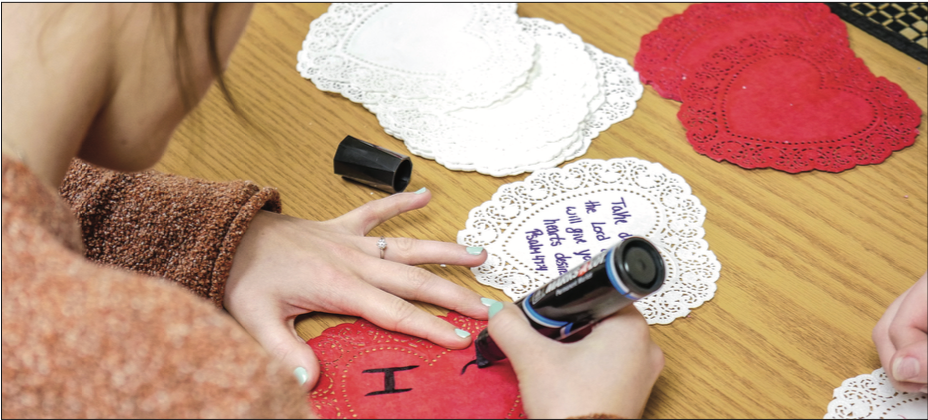Harmonious passions
Licensed counselors share their advice for loving yourself this Valentine’s Day

BE MINE, VALENTINE — Professional counselors encouraged students to look at themselves the way that God looks at them and practice self-love on a daily basis.
Photo Credit: Alexandra Ramey
Valentine’s Day is here, and love is in the air.
Some people are trying to figure out how to love another person, but many are just trying to figure out how to love themselves.
What does that mean?
Love is a commitment, not a feeling, according to Timothy Barclay, associate professor of psychology at Liberty University and a licensed clinical psychologist.
In the case of self-love, it is a commitment to oneself and to others.
People form opinions about themselves based on narratives — the internal self-talk that everyone experiences throughout their day, according to Barclay.
But many have a low sense of self-worth, feel inadequate and unlovable, and feel as though they have nothing to contribute, Barclay said.
These feelings can stem from problems in relationships as they grew up, according to Mike Kunzinger, executive director of Student Counseling Services and a licensed professional counselor in Virginia.
“There’s brokenness there, and unfortunately, that’s a large part of the world’s population, which corrupts what true love should actually be about because we base it too much on emotion,” Barclay said.
When people do not love themselves, they often try to make themselves feel good by relying on external things or even other people, Barclay said.
The goal is to look at yourself the way God looks at you, according to Barclay.
The problem in some Christian circles is looking at only one half of yourself — the broken half.
The solution is to also see the other half — the redeemed half.
“It speaks to my worth that God himself would put on flesh and become man … and die for us and for his creation to redeem it,” Kunzinger said. “If I don’t love myself, I think that’s an assault to God’s goodness and his grace and care for me because I’m rejecting that gift he’s imparted.”
When individuals see themselves as worthless, it affects both them and their interactions with others, according to Barclay.
“I could look at myself (and say), ‘Yeah, I’m faulty, and I’m worm-dirt. I’m sorry, I have nothing to contribute to your life because I constantly beat myself up and remind myself of how worthless I actually am,’” Barclay said.
But what allows a person to pour into others is recognizing that although they are broken, they are redeemed and have God’s image within them, Barclay said.
“I think particularly the cross, and obviously Christ … it calibrates our love because … I’m called to the first and second commandments — which are the greatest commandments — to love God and love others,” Kunzinger said. “In that — out of the place of knowing that I’m loved — I give out of that.”
Self-preoccupation inhibits giving to others, Kunzinger said. Self-preoccupation can take the form of narcissistic self-love or self-deprecation. Both are a deformed love of self, according to Kunzinger.
“I think the goal is, ‘I’m ok with myself, and so I can be in a place of self-forgetfulness because I’m secure,” Kunzinger said. “I’m kind of planted in who I am, in who I am in Christ. So that’s the foundation I would say, for the self being able to give.”
Transformation toward “harmonious passions” that allow a person to give to others is a process of commitment, according to Barclay.
It is forming narratives that are consistent with God’s view of a person.
Barclay said that a person can hear something and cognitively acknowledge it as truth without believing it in a way that changes behavior.
“You really have to dwell in it in order for it to really sink in, so it changes your disposition and changes your nature,” Barclay said. “That’s the transformation that takes place.”
Another part of the transformative process is caring for the self as a whole person, according to Kunzinger.
He said people have five aspects to them: intellectual, emotional, physical, spiritual and social.
At school, the intellectual is nurtured through ideas and topics of interest.
The process is not about being perfect, Kunzinger said.
“It’s more that we look to struggle well,” Kunzinger said. “I don’t know that there’s, ‘Yeah I’ve arrived. I really love myself these days, and that’s going to be a permanent thing.’ Maybe not. Probably not.”
For those who do not believe in Jesus, Barclay said God’s principles can still help them in finding a healthy self-love.
“One of my best friends is a Buddhist, and he has this notion of harmonious passions and loving self, and the importance of a proper self-love and giving to others and loving others,” Barclay said. “He doesn’t believe in Jesus Christ, but he lives according to that truth and principle, and he has a very blessed life.”
Although the blessings do not extend to after death, Barclay said, God’s nature in causing the same sun to shine on the just and the unjust causes truth to work for everyone.
“We will reign and rule with King Jesus forever (as believers),” Kunzinger said. “That sounds pretty important. Not because I’m awesome. It’s because of what Jesus did. You’re going to be a ruler on the new earth. … You have incredible worth, but think about in Christ in you, the glory of that, and being his child.”
So on Valentine’s Day, even though not everyone has a significant other, they always have a Significant Other, Kunzinger said.
“You are loved,” Kunzinger said. “And there is no greater love than this than that a man lay down his life for his friends, and someone has laid down their life for you. So the greatest love there is has been extended to you on Valentine’s Day and every day.”
